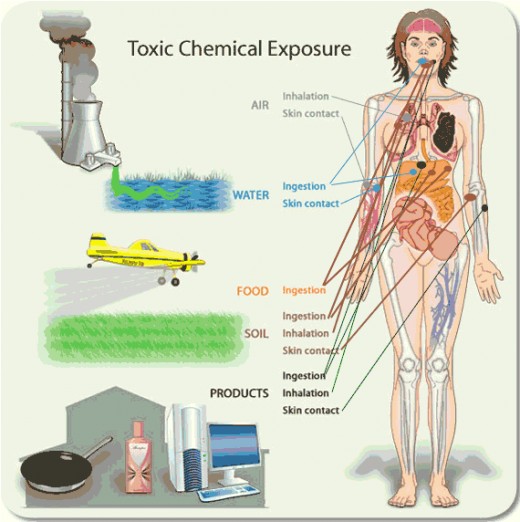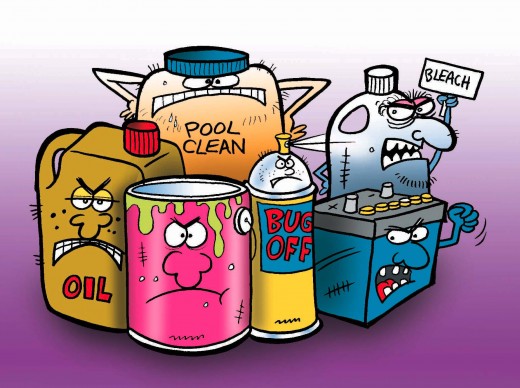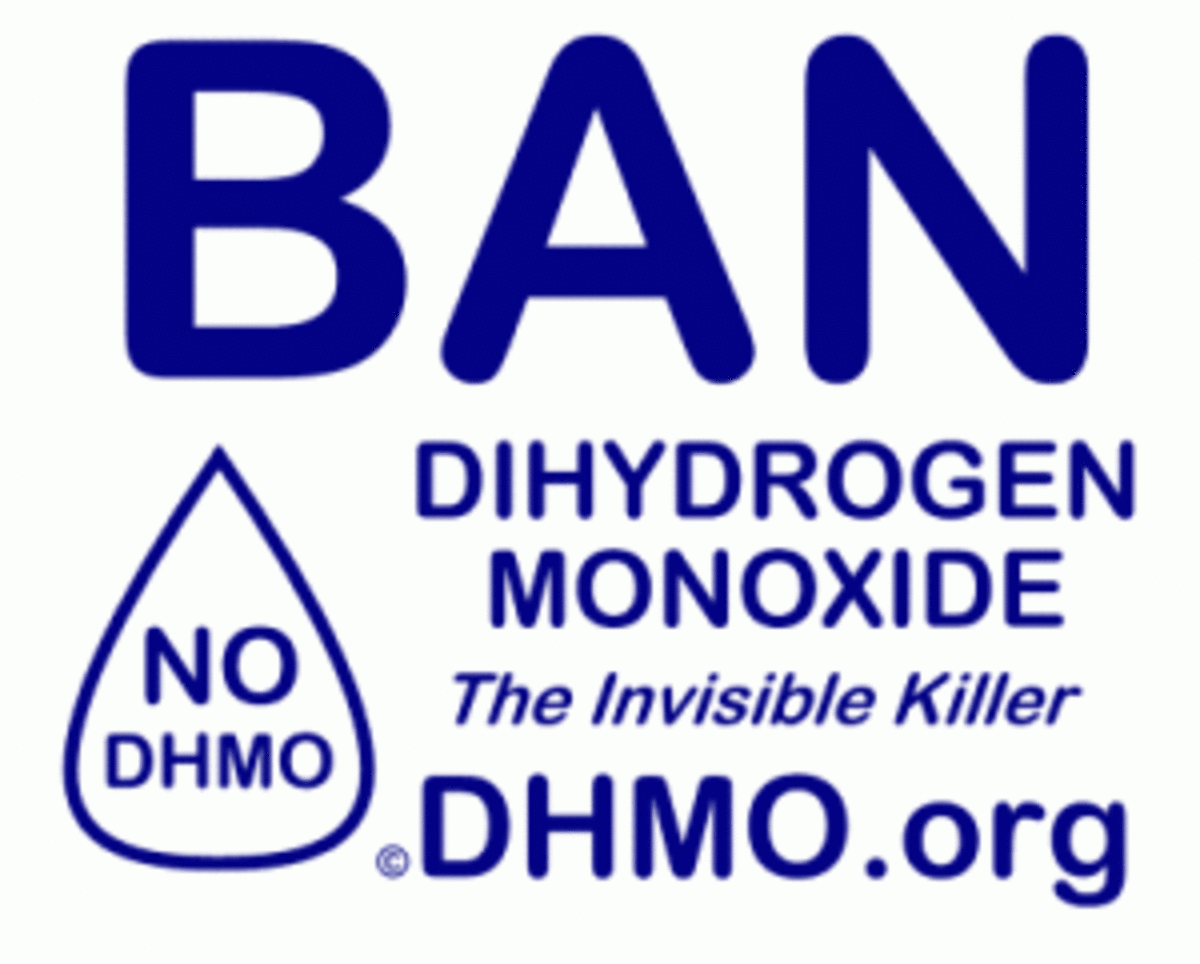Are You Being Poisoned by Toxic Substances?

So what's your poison?
Chemical pollutants, industrial waste contaminants.
For many, toxic substances are a daily reality of work that could be robbing years off their lives.
A toxic substance can be defined as any material able to cause systemic damage to living organisms - in other words 'poison'. They can enter the body many ways: Ingestion, inhalation, absorption, and injection. And for many this may be occurring daily without them even realising. And for some the result will be illness.
Ancient Egypt was the first to use chemicals, soda for making mummies!
Today chemical production occurs on an enormous scale. In the US alone over 200 million tonnes are produced every year. In the UK there are several single plants that produce in excess of 500,000 tonnes per year.
In Australia the chemical industry began with the production of gas from coal and its by-products at Sydney in 1841. In 1860 the manufacture of phosphate fertilisers began for our fast growing agricultural regions. And back then, even more than today, the hazards of working with chemicals were very present.
As example, at the turn of the century, bleach packers were not provided with protective clothing and instead made do with old sacks. Many suffered horrible burns when the bleach was spilt.
The hundreds of millions of tonnes of toxic substances produced worldwide are used for purposes as diverse as household cleaners and fly sprays, from jet-fuel additives to industrial production processes. And many of them are poisonous to humans.
Even domestic chemicals can pose serious health hazards
Be too free with the fly spray around your aquarium and you’ll kill the fish. Inhale that insecticide you so lovingly protect your plants with and you could be hospitalised.
And that’s just the home based sporadically used chemicals, what of the commercial and industrial chemicals many expose themselves to on a daily basis?
A growing number every year are claiming occupational poisoning, with symptoms ranging from skin rashes to serious respiratory disorders and brain damage.
Their work varies from commercial cleaners, nurses, painters, printers, and ceramic tilers… The only common denominator for many of them is that they didn’t know the dangers, or the precautions taken were inadequate.
One such is an Australian named David (surname kept for privacy). A Queenslander Involved in pest-control for 10 years, David is now a victim of Non-Hodgkins indolent grade four lymphatic cancer, and he attributes it to the chemicals he once worked with.
When asks whether he took any precautions, he says, 'Yes, but the precautions laid out by the regulating authorities back then by five separate acts of Parliament are today considered inadequate'. He adds, 'Medical authorities world wide list pesticide exposure as one cause of my illness.'
Unlike many ailments however, chemical poisoning is less easily proven, with symptoms often occurring many years after working with the guilty chemical.
Cumulative Poisoning
Toxicity due to single event exposure, where poisoning is obvious and immediate, is also easier to prove than short term (acute toxicity) and long term (chronic toxicity) multiple exposures, where the cumulative effects of the substance gradually poison the individual over years.
Recent research has shown that some common dementias may be induced by environmental factors. However, symptoms often don't show until later in life, then the natural loss of nerve cells and brain tissue tips the balance and symptoms appear; tremor, weakness, loss of interest, forgetfulness and senility.
One sufferer, a friend of mine and a man in his fifties, had no idea his depression, irritability, and lack of concentration was due to solvent-induced neurotoxicity. Although a printer for 30 years, it had only been in the past few that his symptoms had reached crisis point.
His wife, worried by his strange behaviour and often-vacant expression, had suspected Alzheimers or Parkinson's disease, but it was a union representative who finally recognised his symptoms as a classic case of chemical poisoning. Sadly the man committed suicide after quitting his job.
In many areas of industry and with unacceptable regularity, successive generations are enduring the oversights and mistakes of ‘beneficial’ discoveries of the past, and in no area more-so than the realm of chemical innovation.
The Cost
The cost has too often been human misery taking second place to the accrued profits of big business; many Corporations fighting to the bitter end before acknowledging that the substances their company used were indeed harmful. To mention but a few, DDT, Asbestos, formaldehyde, and even tobacco additives.
A case in point: CFC's were once considered wonder compounds because of their non-toxic, non-flammable, non-reactive properties. Now they are a banned. But the damage to the Ozone layer has already been done, with unforeseen consequences for us below.
And many are those now suffering because of asbestos poisoning. The National Occupational Health and Safety Commission reporting that Australia has a very high and increasing incidence rate of Malignant mesothelioma, a cancer of the outer covering of the lung or the abdominal cavity.
They report that, 'In the past, exposure to asbestos within Australia was very high in some industries and jobs. It is not surprising then that Australia suffers a mesothelioma epidemic of a severe nature.' Formerly rare, it is increasing in incidence and is usually fatal.

Surprisingly, Australia still imports about 2,000 tonnes of chrysotile fibre and some asbestos products per year. Though the handling of asbestos is now subject to strict controls.
However, as the NOHSC support, 'When talking about toxic substances, we must always bear in mind that although potentially dangerous they also perform useful roles in the modern world.'
And this is true; chemicals now being an integral part of our every day lives. In fact we have become dependent on them for our health, food supply, and lifestyle. Directly or indirectly these chemicals have greatly influenced our experience of life.
But, as Dr Micheal Kamrin of the Institute for Environmental Toxicology says, 'In recent years, the contamination of the environment by toxic chemicals has become an increasing problem.' In other words, we're living longer but getting sicker. And in some cases the illnesses being acquired are irreversible in their course.
The National Occupational Health and Safety Commission reports Silicosis is one such disease. Non-reversible and sometimes fatal, it is an illness caused by over exposure to airborne crystalline silica; a substance found in concrete and many cement based products. However, a tour of the construction sites reveals that few if any workers wear masks when working in environments where cement dust is present. How many of these will end up with silicosis is a question only time will reveal.
Although the potential harm of man made substances cannot be denied, the NOHSC says 'If we are to live safely with them, we need to minimise the risks they present - and we can only do this if we understand them.'
But, of course, to understand them means we must be told about them. But in this the question is 'how can we be sure what we are told is accurate', technical innovation always seeming to run several laps ahead of the later to be discovered dangers. And that is of concern, because toxic substances play an ever-increasing role in our world.

© 2010 Richard Parr








